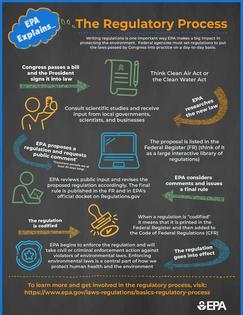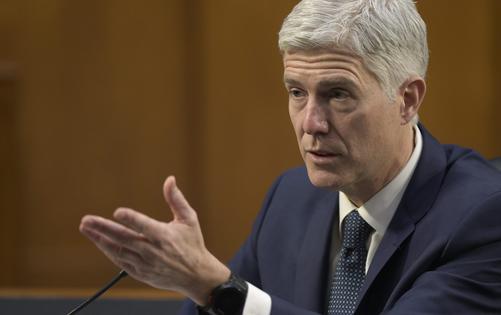What’s next after Supreme Court curbs regulatory power: More focus on laws’ wording, less on their goals
Published in News & Features
Federal Chevron deference is dead. On June 28, 2024, in a 6-3 vote, the Supreme Court overturned the 40-year-old legal tenet that when a federal statute is silent or ambiguous about a particular regulatory issue, courts should defer to the implementing agency’s reasonable interpretation of the law.
The reversal came in a ruling on two fishery regulation cases, Loper Bright Enterprises v. Raimondo and Relentless, Inc. v. Department of Commerce.
This decision means that federal courts will have the final say on what an ambiguous federal statute means. What’s not clear is whether most courts will still listen to expert federal agencies in determining which interpretations make the most sense.
While courts and judges will vary, as a scholar in environmental law, I expect that the demise of Chevron deference will make it easier for federal judges to focus on the exact meaning of Congress’ individual words, rather than on Congress’ goals or the real-life workability of federal laws.
Chevron deference emerged from a 1984 case that addressed the Environmental Protection Agency’s interpretation of the term “stationary source” in the Clean Air Act. The EPA asserted that a “source” could be a facility that contained many individual sources of air pollutant emissions. This meant, for example, that a factory with several smokestacks could be treated as a single source for regulatory purposes, as if it were enclosed in an imaginary bubble.
In upholding the EPA’s decision, the Supreme Court created a two-step test for deciding whether to defer to a federal agency’s interpretation of a statute that it administers.
In Step 1, the court asks whether Congress directly addressed the issue in the statute. If so, then both the court and the agency have to do what Congress directs.
In Step 2, however, if Congress is silent or unclear, then the court should defer to the agency’s interpretation if it is reasonable because agency staff is presumed to be experts on the issue. Justice John Paul Stevens reportedly told his colleagues, “When I am so confused, I go with the agency.”
The central question in both the Loper Bright and Relentless cases was whether the U.S. secretary of commerce could require commercial fishers to pay for onboard observers they were required to bring on some fishing voyages to collect catch data. Lower courts in these cases deferred to the agency’s interpretation that, under the Magnuson-Stevens Fishery Conservation and Management Act, it could require fishers to pay.
However, in an opinion by Chief Justice John Roberts, the Supreme Court majority concluded that Chevron deference contradicts the Administrative Procedure Act. This broad law governs both the procedures that federal agencies must follow and, more importantly, the standards that federal courts must use to review agency actions.
As the majority pointed out, under the Administrative Procedure Act, “courts must ‘decide all relevant questions of law’” – explicitly including interpreting statutes.
Since 1984, Chevron deference has become pervasive in federal administrative law. By the Supreme Court’s count, 70 of its own decisions in that time have turned on Chevron deference.
More importantly, thousands of lower federal court decisions – more than 400 a year on average – have deployed Chevron deference on issues ranging from Social Security benefits to workplace safety standards, immigration eligibility and environmental protection requirements.
Chevron deference gave many federal agencies broad flexibility to use laws to address new and emerging problems that Congress did not anticipate. But some members of the current Supreme Court – as well as some federal appellate judges – criticized this doctrine, for two key reasons.
First, it authorized executive branch agencies to interpret federal law and forced courts to accept agencies’ reasonable interpretations. However, since the Supreme Court’s 1803 decision in Marbury v. Madison, it has been the duty of courts – not federal agencies – to say what the law is.
Second, Chevron deference arguably allowed federal agencies to grab more regulatory authority than Congress intended them to have, usurping the legislative branch’s responsibility to make law and delegate authority.
The court majority emphasized that prior court decisions upholding agency interpretations based on Chevron deference cannot be challenged solely because of that fact. As Roberts wrote, these holdings “are still subject to statutory stare decisis.”
Stare decisis, or “the thing is decided,” is legalese for why courts will respect prior decisions. In other words, no challenger can go back to a court that relied on Chevron deference and ask the court to change its original decision that the agency’s interpretation was OK.
That’s good so far as it goes. However, many agency interpretations of statutes can be challenged multiple times.
For example, the Clean Water Act protects “waters of the United States.” In 2023, the Biden administration issued new regulations interpreting which bodies of water the law covers. Challengers who disagree with that interpretation can attack the regulations directly and argue that the agencies’ reading of the law is wrong, as the fishing companies did in the Loper Bright cases.
However, under many laws, businesses and individuals can also challenge an agency interpretation at the moment when the agency decides that a general regulation applies specifically to them. These are called “as applied” challenges. After Loper Bright, any time an agency that benefited from Chevron deference goes to apply its interpretation to a new regulated entity, that regulated entity can challenge the agency interpretation – and this time the agency won’t get Chevron deference.
Eliminating Chevron deference will likely worsen an existing division among judges, and justices, about how to go about interpreting statutes. It centers on how much a statute’s purpose and context should matter – or, instead, how much the judge should focus on the “plain meaning” of the particular words that Congress chose to use.
Suppose, for example, that a federal court faced the issue of how to define a vegetable for purposes of determining whether import taxes apply to imported tomato sauce. A plain meaning approach would emphasize that Congress decided to tax vegetables and that tomatoes are fruits; hence, tomato sauce is not subject to the import tax.
An approach focused on Congress’ purpose, in contrast, would emphasize that Congress wanted to tax all imports of savory foods that the public generally considers to be vegetables. Using this approach, the Supreme Court in 1893, in fact, decided that tomatoes were vegetables subject to import taxes.
Federal agencies typically take Congress’ purpose and the context in which regulators act very much into account when they decide what laws mean. For example, when the Food and Drug Administration had to distinguish proteins, which qualify as biologics for regulatory purposes, from chains of amino acids, which qualify as drugs, it focused on Congress’ reasons for creating the two categories. Ultimately, the agency decided that a molecule made up of amino acids had to have a certain level of complexity to qualify as a protein, and hence a biologic.
In contrast, ever since the late Justice Antonin Scalia joined the Supreme Court in 1986, federal judges – and especially Supreme Court justices – have taken an increasingly “plain meaning,” or textualist approach, to statutory interpretation. The current Supreme Court, for example, would almost certainly never have allowed a tomato to be a vegetable.
Dissenting Justices Elena Kagan, Sonia Sotomayor and Ketanji Brown-Jackson, along with many other legal experts, foresee serious problems for future cases that turn on highly technical issues. What will happen when a statute’s nonexpert plain meaning makes no practical sense in a highly technical or scientifically nuanced regulatory regime, such as the FDA classifying biologics and drugs?
This ruling also may signal that the court plans to pay greater attention to the 1946 Administrative Procedure Act’s primacy in federal administrative law. This statute had been in place for almost 40 years when the Supreme Court decided Chevron in 1984, and the Chevron majority did not see it as a problem at the time.
Now, however, it has become a reason to overturn Chevron deference. Other court-created glosses on administrative law may also be dead doctrines walking.
Congress can and has created different standards of review in other statutes, including the Clean Air Act that led to the Chevron decision. What if a future Congress specifically directs that the implementing agency should take the lead in interpreting a particular statute?
I expect that the Supreme Court would reach for the Constitution and declare any such delegation unconstitutional. In other words, it is probably only a matter of time before Loper Bright’s overruling of Chevron deference becomes a matter of federal constitutional law.
This is an updated version of an article originally published January 17, 2024.
This article is republished from The Conversation, a nonprofit, independent news organization bringing you facts and analysis to help you make sense of our complex world.
Read more:
Would you sit on a jury to review government regulations? Citizen oversight panels could make this process more open and democratic
The Supreme Court just shriveled federal protection for wetlands, leaving many of these valuable ecosystems at risk
Robin Kundis Craig does not work for, consult, own shares in or receive funding from any company or organization that would benefit from this article, and has disclosed no relevant affiliations beyond their academic appointment.













Comments